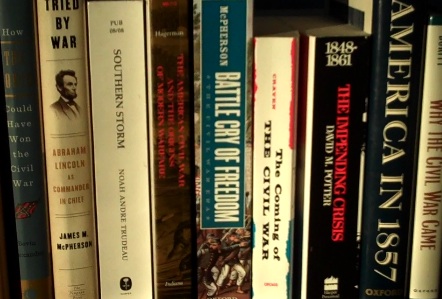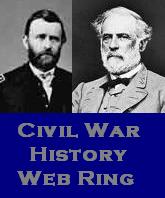Archive for February 13th, 2008
History as Science
Should the study of history be scientific? The debate between historians, philosophers, and sociologist around whether history should be based on science has been a topic in my historiography class (see courses here). The biggest brouhaha took place in the late 1800’s when the world was still feeling the effects of the Industrial Revolution and scientific method was becoming all the rage.
Ernst Breisach (left), who author’s our primary text for the class [Historiography: Ancient, Medieval, and Modern], provides a survey of this quest to find a reason for history and its place alongside other areas of study. He provides a look at the players in those countries most engaged in the debate: France, England, Germany, and America.
Auguste Comte, who I mentioned in my post here, was a player. He believed that man was of one collective mind and thus progressed intellectually as one. He proposed a model called “The Three Stages of History” which posited that all thought, emotive forces, and sciences progress through three eras: (1) theological, (2) metaphysical, and (3) positive. Events in the theological era were explained by “God’s will.” In the metaphysical era, they were explained by natural laws. Eventually, he predicted, man would enter an endless “positive” era where events could be explained by positive philosophy and laws. Society, politics, and culture would radically change in this state and man’s collective mind would reach a pinnacle needing no further development. The sciences would organize human life according to laws governing phenomena. These laws would be based on sensory experience; things which could be observed. Comte felt that mankind was on the cusp of moving into that final stage which he predicted began with the French Revolution and would go on forever.

Comte’s ideas fell flat among many. Contrarians argued that once this utopia in human development was reached, there would be little left to do. Not only that but the very foundations of idealist philosophy would be destabilized. God, ideas, uniqueness, and intuition would be considered irrelevant.
But the idea that science could lead to a higher stage of intellectual development governed by overarching laws stuck and a new school of thought was born that became known as “positivist.” Positivism grew in popularity and historians who embraced it began looking for overarching laws that governed, for example, the nature and destiny of nations. If the principles applied to the natural sciences could be applied to history, surely these laws would exist!
British historian Henry Thomas Buckle (right) jumped on the positivist band wagon and called on other British historians to fall in step with more scientific approaches or be ignored. His direction was to abandon the historiography of description in favor of an approach in line with natural sciences. The British didn’t buy it. With few exceptions, they remained attached to the notion that history required careful interpretation and narration by historians. Moral lessons could be found in history that were necessary for the education of the young. Viewing history as science was nothing less than dangerous.
Americans, on the other hand, took to historical science with enthusiasm. History associations and history journals were formed. University history departments in the model of other scientifically-based disciplines were created. The notion of professional and academic historians emerged and it wasn’t long before amateur historians were pushed aside. Breisach called it “The Great Divorce.” (p. 287) More on that in a later post. Americans never demanded nor sought great laws governing human affairs but embraced the benefits and ambiguities of “scientific history,” incorporated what were arguably the best of the interpretations from around the world, and put an American stamp on it.
What else changed? Plenty. Documentation of sources became more important. Historical writing became more formal and less accessible or interesting to the reading public. If the style of writing didn’t change, it was criticized. So “literary” and “romantic” history became passe. Thus the work of such notable historians as George Bancroft became discredited. Historians began to specialize. The use of quantitative methods  as a basis for drawing historical conclusions grew. [Needless to say, a paradigm-shift in quantitative methods occurred as a result of computer technology in the 20th century.] Economic history surged as a field of study in the early 20th century and continues strong today.
as a basis for drawing historical conclusions grew. [Needless to say, a paradigm-shift in quantitative methods occurred as a result of computer technology in the 20th century.] Economic history surged as a field of study in the early 20th century and continues strong today.
Not everyone has approved over the years. Breisach provides a wonderful quote by Arthur Schlesinger, Jr. who said that the really important questions of historical inquiry are important because they can’t be quantified. Teddy Roosevelt, Jr. protested accusing professional historians of becoming so enamored with detailed research that they “did much real harm in preventing the development of students who might have a large grasp of what history should be.” (p. 288)
Certainly both the quantitative and the qualitative have a place in the study of history. There is no doubt that methods used in other fields like economics, data analysis and statistics can provide great insight into the study of history (See Cliometrics). This is the stuff that counter-factual analysis was built on. But finding the right balance remains a challenge.
Of interest, positivism had a rebirth in the 1920s but, interestingly, proponents of the narrative form of history surged back in the 1960s as humanists challenged pure scientific historiography. For me, there will always be a place for outstanding narrative in the telling of history. Like the British at the turn of the century, I believe in well told history that occasionally has a brilliant moral in the telling.
Ernst Breisach, Historiography: Ancient, Medieval, and Modern, (The University of Chicago Press: Chicago, 2007). Chapter referenced: “History and the Quest for a Uniform Science.”
Copyright Rene Tyree 2008
Image of depiction of the data items found in the perspectives of the Zachman Framework by Stan Locke, January 2008, Wikipedia.
Other photos from Wikipedia Commons, public domain.
Diagram of Comte’s Three Stages of History, self-made, Rene Tyree, Feb. 13, 2008.
Written by Rene Tyree
February 13, 2008 at 11:34 pm
Posted in Aguste Comte, Ernst Breisach, Henry Thomas Buckle, Historiography, Theodore Roosevelt Jr.
Tagged with American Civil War, Arth Schlesinger, August Comte, British Historiography, cliometrics, Comte's Three Stages of History, counter-factual analysis, Economic history, Ernst Breisach, french revolution, George Bancroft, God's Will, Henry Thomas Buckle, Historiography, history, History as Science, humanists, Industrial revolution, literary history, Luther, metaphysical era, narrative history, natural laws, positive era, Positivism, Positivist, Romantic History, scientific historiography, Teddy Roosevelt, Theodore Roosevilt, theological era



















































